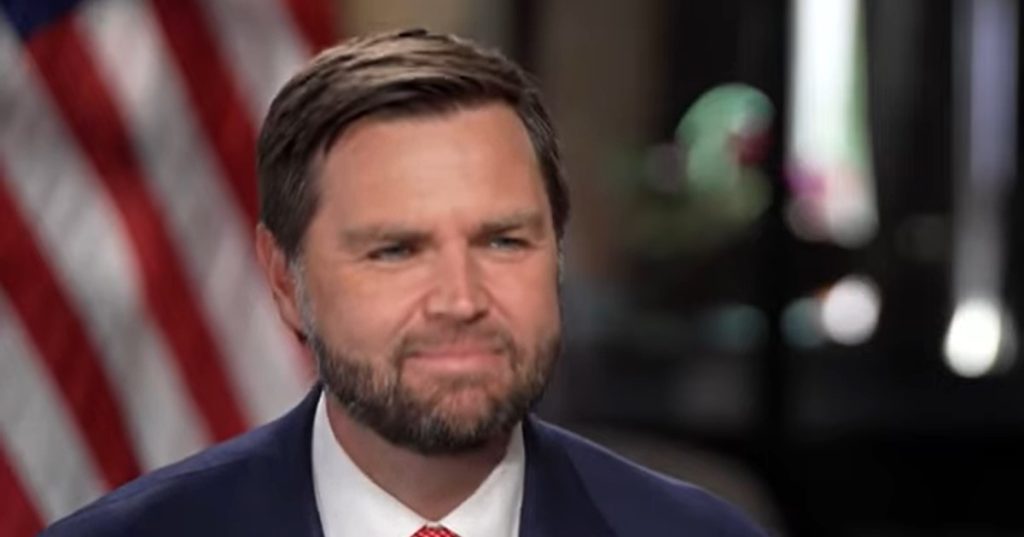Director of National Intelligence Tulsi Gabbard recently brought to light that top officials within the Obama administration manipulated intelligence to falsely implicate President Donald Trump in Russian collusion. This revelation was spotlighted by Vice President J.D. Vance, who expressed a strong desire to see those responsible face legal consequences. Vance emphasized the need for the law to prevail, stating that indictments should occur only when legal boundaries have been crossed.
Vice President Vance articulated his stance during an interview with Maria Bartiromo on “Sunday Morning Futures,” highlighting the severity of the alleged violations. He stressed the importance of basing indictments on solid legal grounds rather than mere political motivations. The Vice President expressed confidence that the recent revelations by Tulsi Gabbard and Kash Patel demonstrate clear violations of the law.
The discussion on Bartiromo’s show delved into the gravity of the accusations, with Vance asserting his belief that significant legal repercussions should follow. He expressed concern for the integrity of the intelligence community, suggesting that their focus should be on national security rather than political machinations. Vance criticized the misuse of intelligence for political ends, describing it as a disservice to the American public.
Gabbard’s findings, shared in a press release from her office on July 18, detailed the inconsistencies in the Intelligence Community’s assessments regarding Russian influence. The release indicated that the intelligence community had assessed that Russia was likely not attempting to influence the election through cyber means. Despite these assessments, actions taken by the Obama administration seemed to contradict these findings.
The press release highlighted how, on December 7, 2016, post-election, DNI James Clapper was provided with talking points confirming that foreign adversaries did not use cyberattacks to alter the election’s outcome. However, just two days later, a meeting was convened at the White House to discuss Russia, which led to a request for a new intelligence assessment. This request raised eyebrows, given the previous intelligence conclusions.
The press release went on to name several prominent figures from the Obama administration, bringing them into the spotlight. These individuals included former Secretary of State Hillary Clinton, former CIA Director John Brennan, and former DNI James Clapper, among others. The involvement of these high-profile figures underscores the significance of the allegations.
The revelations have stirred discussions in conservative circles, with many calling for accountability and transparency. Fox News and other media outlets have echoed these sentiments, highlighting the potential legal and political ramifications. The role of the intelligence community and its impartiality has become a focal point in these discussions.
Critics argue that the alleged politicization of intelligence undermines public trust and the very foundations of democracy. They contend that the intelligence community should remain apolitical and focused on safeguarding national security. The situation has sparked a wider debate on the appropriate boundaries between intelligence operations and political agendas.
Supporters of Vance’s stance argue that holding accountable those who abuse their positions is essential for maintaining the integrity of governmental institutions. They believe that ensuring justice and transparency is crucial for restoring public confidence. The controversy has brought attention to the delicate balance between national security and political influence.
The conversation continues to unfold, with conservative commentators and media outlets closely monitoring developments. The potential for legal proceedings against those involved adds another layer of complexity to the situation. The outcome of these discussions may have significant implications for the broader political landscape.
As the debate rages on, the importance of maintaining an impartial and effective intelligence community remains at the forefront. Ensuring that intelligence operations are free from political bias is vital for the nation’s security and democratic processes. The situation serves as a reminder of the responsibilities that come with positions of power.
The unfolding events have reignited discussions on the role of the media in shaping public perception. The dissemination of information and the narratives constructed around these revelations are being scrutinized. The situation highlights the need for balanced reporting and critical analysis in times of political controversy.
The broader implications of these allegations continue to be a topic of interest for political analysts and commentators. The potential impact on future elections and the political climate is being pondered. The unfolding narrative serves as a case study in the intersection between politics and intelligence.



